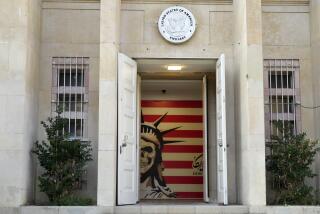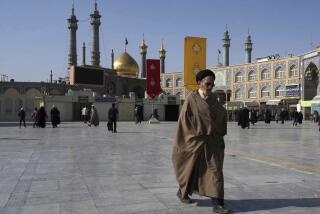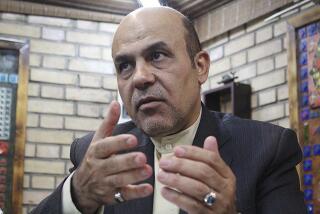Khatami Has Tough Words for the U.S.
NEW YORK — Iranian President Mohammad Khatami said Monday that the United States must earn renewed political and economic ties with his country through accountability for its actions against Iran, including its role in a coup five decades ago that ultimately restored the shah to power.
Any relationship with the United States must be in Iran’s national interest, Khatami said in a speech to about 1,000 expatriates who packed a United Nations conference room at the invitation of the Iranian mission to the world body.
But to Iranian Americans, many of whom fled Iran after Muslim clerics took control in 1979, Khatami extended an olive branch and drew multiple ovations, especially from younger participants who for years were dismissed by the Islamic Republic as gharb-zadeh, or foreign-born.
Khatami, who is in New York to attend the United Nations’ Millennium Summit, praised Iranians living abroad for keeping the love for their homeland alive in their children. He appealed to their common heritage and raised their patriotic fervor when he recalled how Iran successfully resisted Arab influence 13 centuries ago while embracing the “righteousness and justice of Islam.” He lauded Jews, Zoroastrians and other Iranian minorities for their contributions to the country’s history and culture over the past 2,500 years.
The president also pleaded for expatriates to be patient with the slow pace of reforms that are aimed at establishing a more democratic Islamic Republic, in which leaders and citizens live by the letter of the constitution.
“For the first time, the government is for the people’s freedom, instead of opposing it,” Khatami said, an apparent reference to the ongoing reforms.
Khatami’s reforms have met fierce resistance from Iran’s old guard of conservative rulers, led by Supreme Leader Ayatollah Ali Khamenei, who have refused to relinquish power despite several defeats at the polls. They control the courts, military and the broadcast networks, as well as the powerful Guardian Council that vets all legislation passed by parliament, which is dominated by reformists.
To the audience, some of Khatami’s remarks held hidden meaning. Members spent hours afterward dissecting each comment for its real value, a tradition among Iranians used to getting less than the truth from their leaders.
So when Khatami apologized ahead of time for being long-winded, several interpretations emerged. “I hope I won’t talk for too long,” he said, drawing muted laughter.
University of Maryland student Babak Talebi interpreted the remark as a quip in response to criticism that Khatami’s talk of reform has not always translated into action. But Talebi’s friend Poopak Taati insisted that the president’s self-reflection was a joke on himself. After all, as his nation’s leader, he was expected to give a lengthy talk, she said.
Monday’s gathering was the second in as many years at which Khatami addressed expatriate Iranians. Some in attendance said the meeting room was used recently for the U.N.’s 50th anniversary celebration of international human rights efforts. A few opponents of Iran’s clerical rule privately described the use of the room Monday as ironic, given the Islamic Republic’s history of arrests and executions of its citizens on political and religious grounds.
Such actions on the part of the regime prompted some Iranian Americans to decline their invitations to the meeting.
“Under the circumstances, awaiting the [sentencing], we did not really think it was the right time to have this sort of exchange,” said Sam Kermanian, an official with the Iranian American Jewish Federation, based in Los Angeles. He was referring to today’s expected announcement on the fate of 10 Iranian Jews recently convicted by a clerical court in Shiraz on espionage charges--convictions that many believe lack merit.
A regime opponent who asked not to be identified added, “There are some hopes with respect for Khatami’s plans for the future, but at this point, he’s still representing a regime under which Iranian minorities feel they have not been treated fairly.”
Opposition groups that are more vocal planned demonstrations today in New York and Los Angeles against Khatami’s visit.
Those plans were met with disdain by many expatriates in attendance Monday, who insisted that the only hope for reform lies in dialogue, not isolation of a regime many don’t agree with. That included a handful of female participants at the meeting who did not cover their hair--a display of opposition to current Iranian law requiring all women to do so.
The fact that Khatami is president is a visible first step of a changing government, said Mohamad Navab, a professor of cardiology and medicine in Los Angeles. “His election itself is the first time in Iranian history where people did the opposite of what their leader said,” Navab said, referring to Khamenei’s first choice for president, Ali Akbar Nateq-Nuri, the conservative speaker of parliament.
The meeting also provided a venue for talk about Iran’s lagging economy, with double-digit unemployment and ever-burgeoning inflation, other participants said.
“This is a great opportunity to speak my mind, to be able to ask questions instead of sitting out there and complaining,” said Titra Parsi, who flew to New York from Stockholm on Friday to attend.
That opportunity was quickly dashed, however, after the president and a handful of other speakers exceeded the allotted three-hour conference time. The planned question-and-answer segment was abruptly canceled, and participants were ushered out the door by impatient U.N. security officers.
Questions had to be placed in writing inside boxes set up at the back of the conference room, organizers said. Responses would come in a few days in the form of e-mail.
Which is what Taati, a sociology professor at Montgomery College in Maryland promptly did, asking a question related to the treatment of women in Iran.
“I don’t know that it is he [Khatami] who will answer it, but he left out women” from his speech, she explained.
More to Read
Sign up for Essential California
The most important California stories and recommendations in your inbox every morning.
You may occasionally receive promotional content from the Los Angeles Times.










